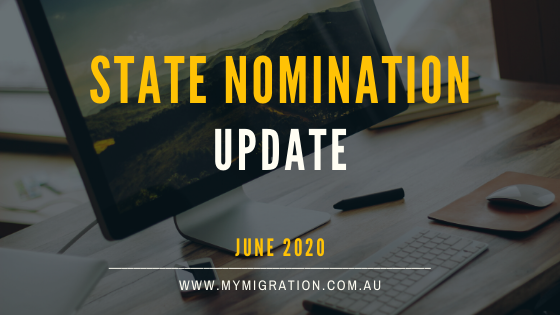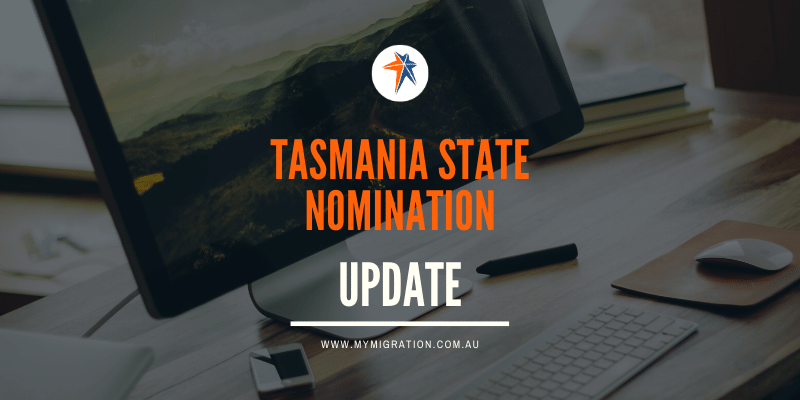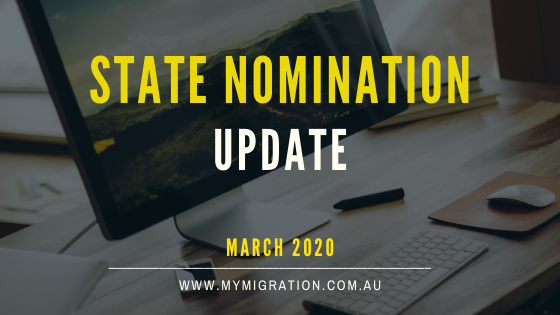Victoria (VIC)
The Victorian Government’s state nomination program will remain temporarily closed while we await the Commonwealth Government’s allocation of state nomination places for 2020-21.
In the meantime, you will not be able to apply for the following state nomination visas:
- Skilled Work Regional (Provisional) (subclass 491) visa
- Skiled Nominated (subclass 190) visa
- Business Innovation stream (subclass 188A) (Provisional) visa
- Investor stream (subclass 188B) (Provisional) visa
- Significant Investor stream (subclass 188C) (Provisional) visa
- Entrepreneur stream (subclass 188E) (Provisional) visa
- Significant Business History (subclass 132A) (Permanent) visa
- Venture Capital Entrepreneur (subclass 132B) (Permanent) visa
The 2020-21 Victorian state nomination program will open at a date to be advised after further advice from the Commonwealth Government. Please check our website news regularly for more information.
Canberra (ACT)
New application guidelines are now available.
You can access the new guidelines here: http://www.canberrayourfuture.com.au/workspace /uploads/documents/491-190-nomination-guidelines-january-2020.pdf
ACT Invitation Round
Invitation date: 3 June 2020
ACT 190 Nomination – invitations issued: 81
- All Matrix submitted: 110 to 70 points
ACT 491 Nomination – No invitations were issued as there are sufficient 491 applications in the queue to meet the 2019/20 annual allocation of 491 nomination places.
Source: http://www.canberrayourfuture.com.au/portal/migrating/article/canberra-matrix-invitation-round/
Tasmania (TAS)
Updated processing times: The current processing time for the majority of Tasmanian visa state nomination applications is between 4 and 5 months.
Source: https://www.migration.tas.gov.au/news/Processing_times
Fees: All Tasmanian visa state nomination applications (Subclass 190 and Subclass 491) now incur a FEE FOR SERVICE of $220 (GST inclusive). During the online application process a $220 fee will be required, when processed you will be able to ‘SUBMIT’ the application for processing.
Source: https://www.migration.tas.gov.au/skilled_migrants/skilled_nominated_visa
Tasmania State Nomination Criteria
Flexible nomination requirements for applicants affected by COVID-19 restrictions
Summary of Relaxations in Nomination Requirements (Category 1 – Tasmanian Graduate)
Students currently in Tasmania: TAS will accept online study with a Tasmanian CRICOS provider completed during the period courses were not able to be delivered on campus. Applicants must have been living in Tasmania during this period and must have completed all of their study in Tasmania.
Graduates who have completed study in Tasmania but are unable to return after travelling overseas: Eligible for consideration if able to provide evidence course was completed in Tasmania, have temporarily left Tasmania and are unable to return due to the COVID-19 restrictions. Students must show that they were genuinely affected by travel restrictions and intend to return to Tasmania. These applicants must meet all other published requirements for subclass 190 or 491 nomination, including the minimum Tasmanian residence period.
Currently overseas – partially completed course: Remote / online study for applicants who commenced their courses in Tasmania, departed temporarily and have been unable to return to Tasmania due to COVID 19 travel restrictions will be accepted where they have genuinely been unable to return to Tasmania. Applicants must have commenced course in Tasmania, lived in Tasmania for a minimum 12 months and completed a minimum total of 12 months study on campus.
New enrolments – course commenced outside Tasmania: Applicants who commenced study with a Tasmanian institution, but were unable to arrive in Tasmania due to COVID-19 restrictions and commenced their studies remotely while waiting for restrictions to be lifted will be eligible for consideration if they:
- Completed a two academic year course and arrived in Tasmania soon after restrictions were lifted; and
- Lived and studied in Tasmania for a period of at least 12 months
Courses of one academic year must be completed solely in Tasmania – no period of remote study will be accepted. This includes students who enrolled in one-year courses but did not arrive in Tasmania before entry restrictions.
Summary of Relaxations in Nomination Requirements (Category 2 – Working in Tasmania)
Flexibility will be applied to applicants genuinely affected by COVID-19 employment stand-downs before or after meeting the mandatory 6-month full-time employment. Each application will be considered on its merits according to the particular industry, the skills of the applicant, and the likelihood of being able to return to and maintain full time in the future.
In general, following factors will be taken into consideration:
- A minimum 3 months full time employment up to the closure or business / reduction in hours.
- Full-time employment ceased directly due to a COVID-19 related closedown or restriction.
- There is a reasonable likelihood of being able to return to employment (full or part-time) after the workplace restrictions have been lifted (i.e a written evidence from employer).
Reduction in hours from full-time to part-time as a result of COVID-19 restrictions will be considered with leniency.
Source: https://www.migration.tas.gov.au/skilled_migrants/skilled_nominated_visa
Northern Territory (NT)
State nomination requirements and processing time.
General information:
- if you or any of your migrating dependants are currently living interstate, you will not be eligible for the Northern Territory (NT) nomination
- if you or any of your migrating dependants are currently on a student visa and are currently studying in an NT institution, you will not be eligible for NT nomination
- if you have already been nominated for a subclass 489 or 491 visa by the NT, you will not be eligible for a subclass 190 nomination.
International student graduates who have studied in the NT will be eligible for a subclass 190 nomination if you have:
- successfully completed one or more qualifications after studying in the NT, at an NT-based institution for two years in a single tertiary course or a set of nested tertiary courses, and
- lived in the NT for a period of at least six continuous months immediately after the date of completion* of your last qualification, while holding a visa that allows full-time work (this requirement does not apply to students who completed all course requirements in semester one 2020 and produce a letter of completion dated prior to 1 August 2020), and
- demonstrated genuine and sustained efforts to obtain employment** from an NT employer in your nominated occupation or a closely related skilled occupation.
International student graduates who are unable to live in the NT for six months after completing two years of study in the NT will only be considered for a subclass 491 nomination. You must provide evidence of making genuine efforts to obtain employment from an NT employer in their nominated occupation or a closely related skilled occupation.
NT Residents
An NT resident applicant includes those on temporary visas with work rights, currently residing in the NT. NT resident applicants will be eligible for a subclass 190 nomination if you:
- demonstrate that you have been residing in the NT for at least two consecutive years immediately prior to application
- demonstrate that none of your migrating dependants are residing in another part of Australia, and
- demonstrate full-time employment in the NT in an eligible occupation continuously for at least two years immediately prior to applying for NT nomination and demonstrate the employment is available for at least a further 12 months.
NT resident applicants will be considered for a subclass 491 nomination if you meet the following requirements:
- applicants who started living in the NT prior to 1 July 2020, must:
- demonstrate that you have been residing in the NT for at least six consecutive months immediately prior to application
- demonstrate that none of your migrating dependants are residing in another part of Australia, and
- demonstrate full-time employment in the NT in an eligible occupation for at least six consecutive months immediately prior to applying for NT nomination and demonstrate the employment is available for at least a further 12 months.
- applicants who start living in the NT on or after 1 July 2020, must:
- demonstrate that you have been residing in the NT for at least 12 consecutive months
- demonstrate that none of your migrating dependants are residing in another part of Australia, and
- demonstrate full-time employment in the NT in an eligible occupation for at least six consecutive months immediately prior to applying for NT nomination and demonstrate that the employment is available for at least a further 12 months.
The employment must also meet the following additional requirements:
- the position must be based in the NT, and the employer must have a record of trading in the NT for at least 12 months
- positions that are based at serviced office spaces or involve hot-desking arrangements will generally not be considered favourably
- you must be paid at market salary.
Applicants who have not been employed in an eligible occupation will generally not qualify for NT nomination.
Applicants who have been employed on a full-time basis for at least six consecutive months in an occupation that is not an eligible occupation may qualify for a subclass 491 nomination on an exceptional and case by case basis if you are able to demonstrate the following:
- the employer has made genuine efforts to recruit locally and the position cannot be filled by an Australian citizen or permanent resident – at a minimum, evidence should include copies of advertisements placed, and a statement from the employer detailing the number of applicants and reasons as to why no Australian citizens or permanent residents have not been recruited
- there is a genuine need for the position in the business – at a minimum, evidence should include a detailed statement from the employer explaining the need for the position and how the vacancy arose
- you have made genuine and sustained efforts to obtain employment in your nominated occupation or a related occupation in the NT – at a minimum, evidence must include copies / screenshots of applications made for relevant jobs and any feedback received.
Interested to know more?
Click here to book a consultation with one of our friendly consultants. You may also fill out the Online Assessment Form for a free assessment to know your eligibility for a visa to Australia.
Disclaimer
The above article constitutes only generic information on migration issues, and does not constitute specific migration advice to any entity or individual.





